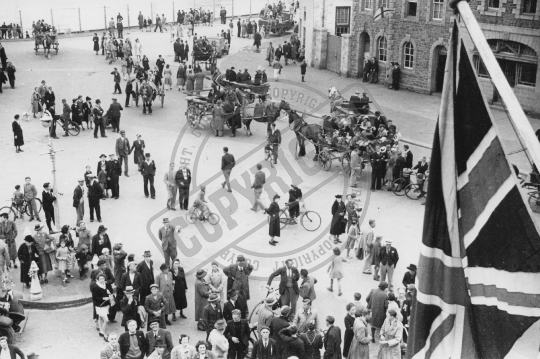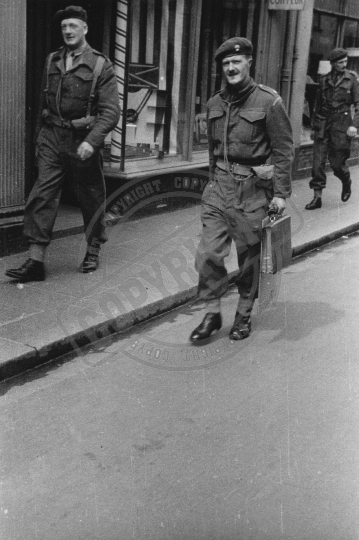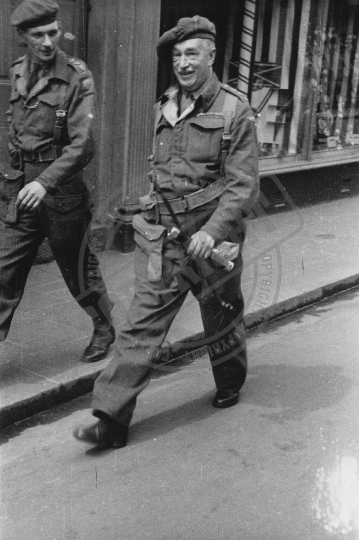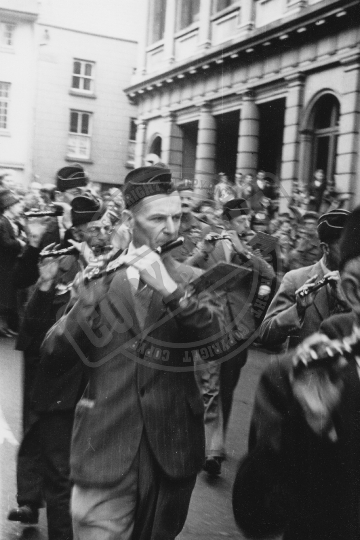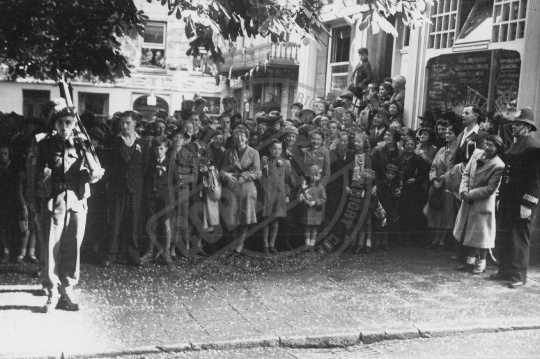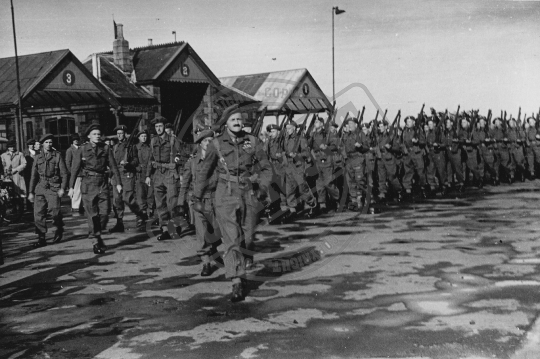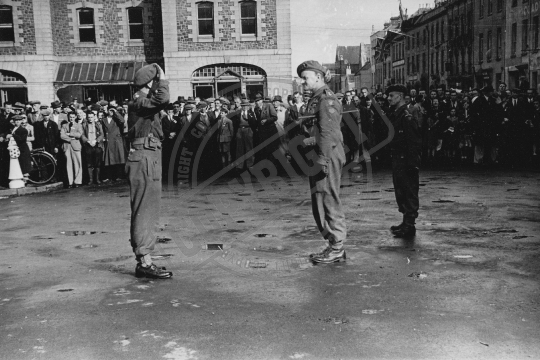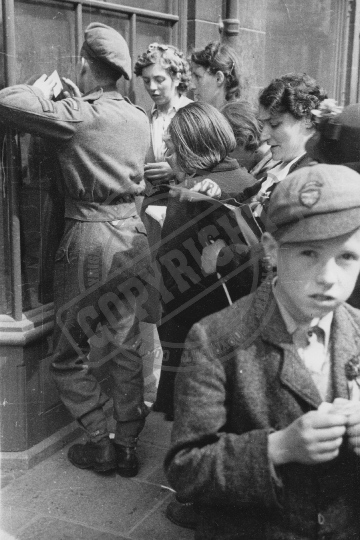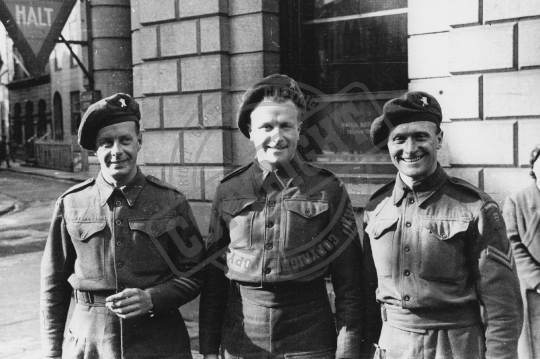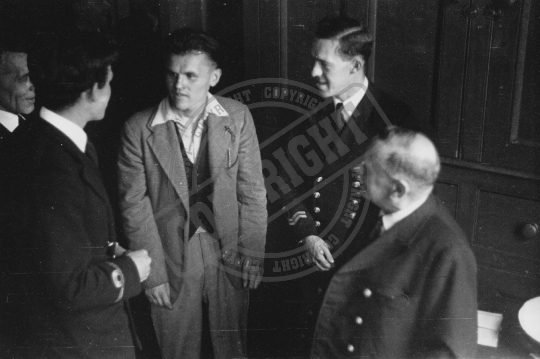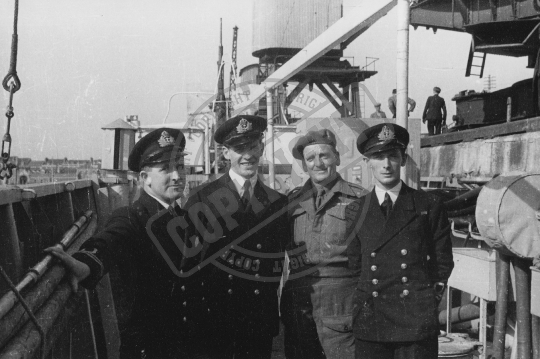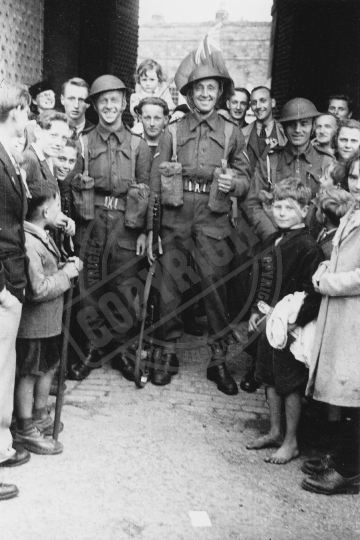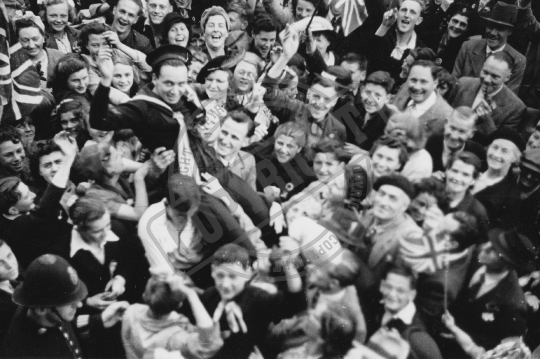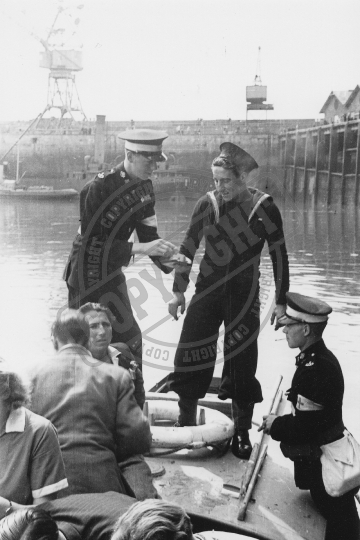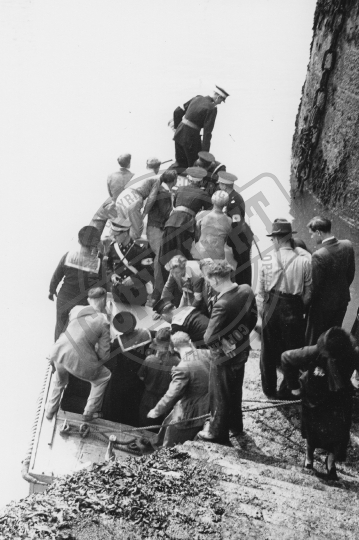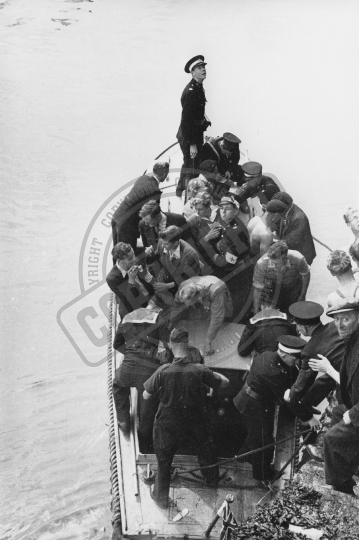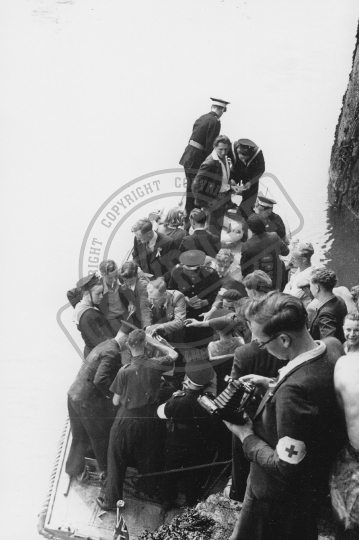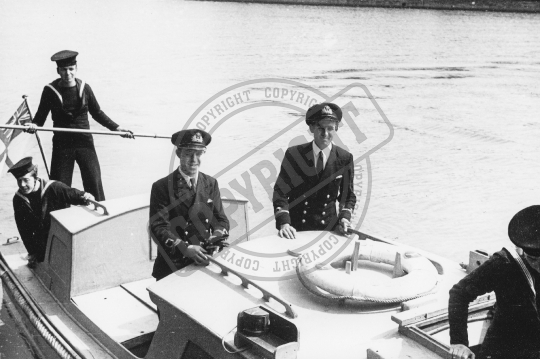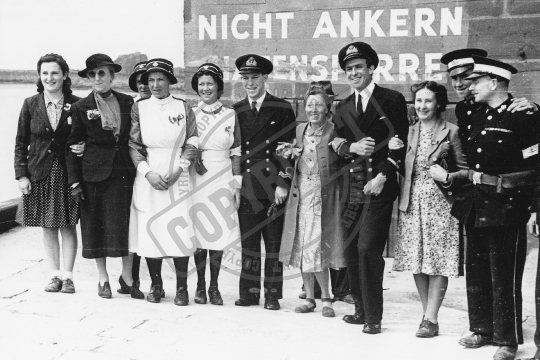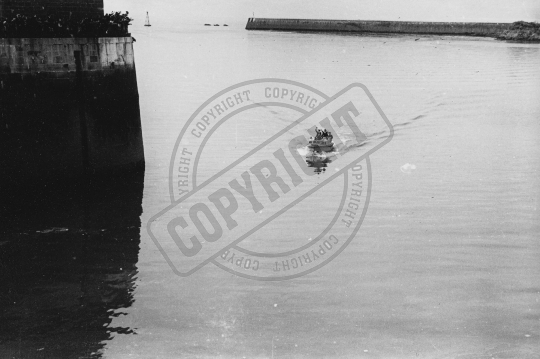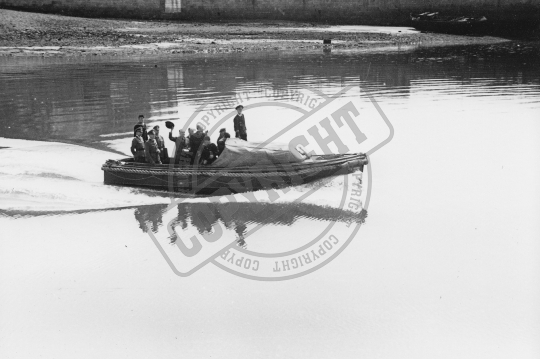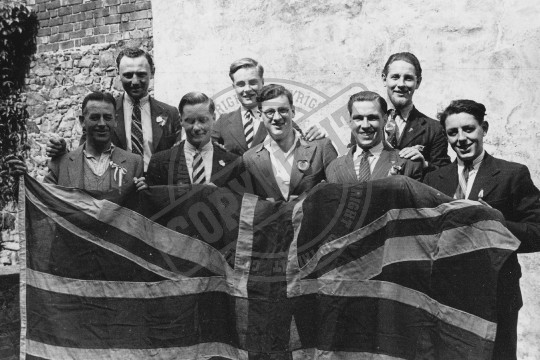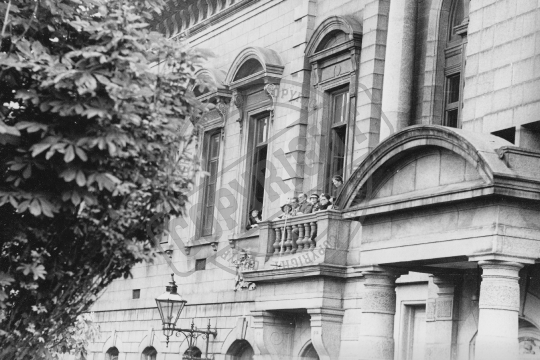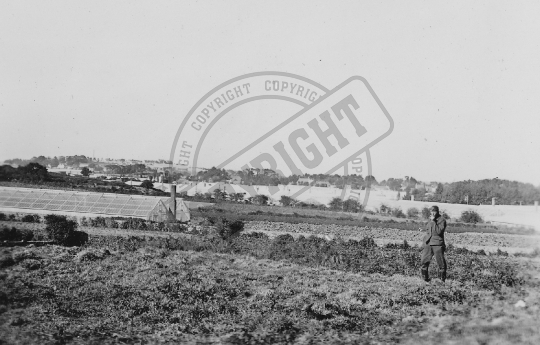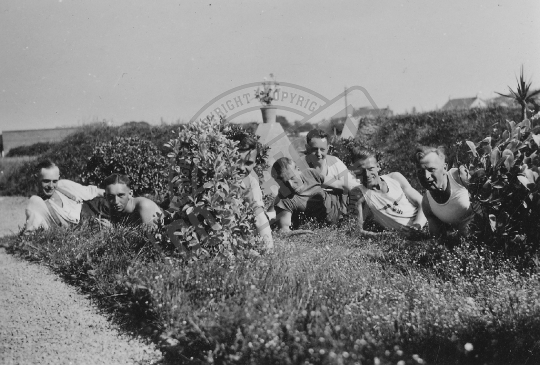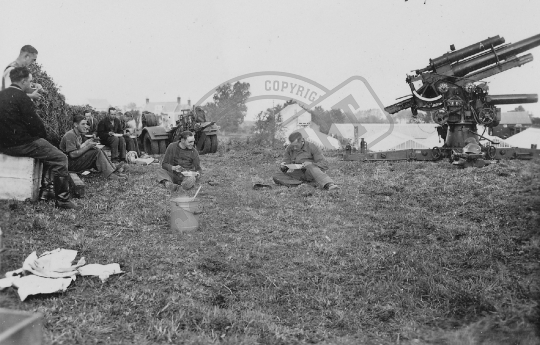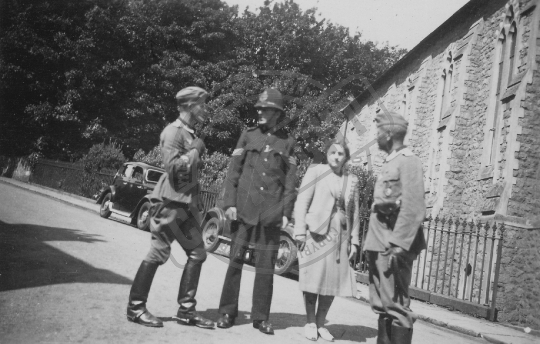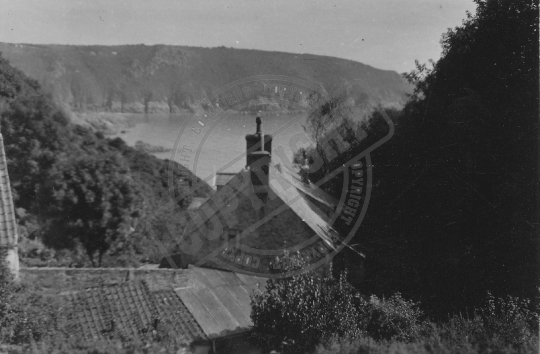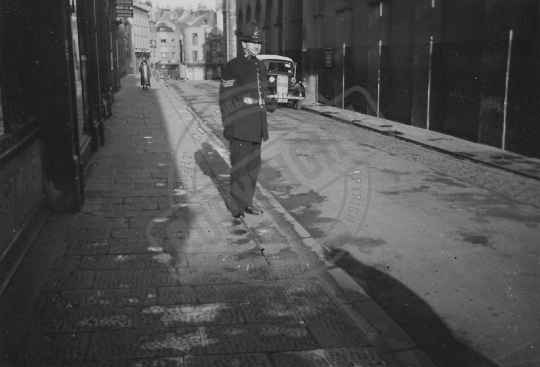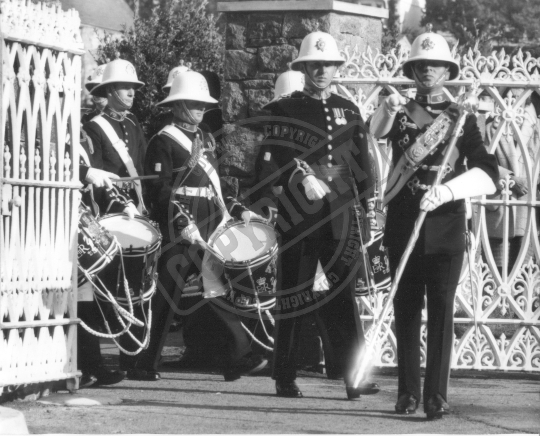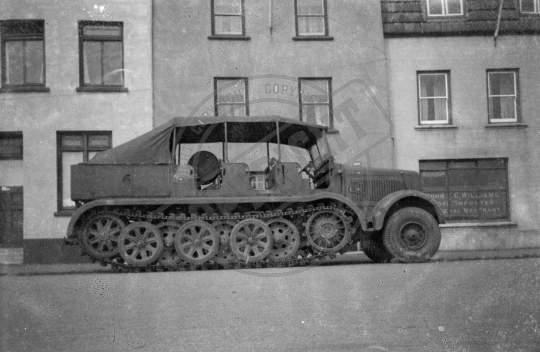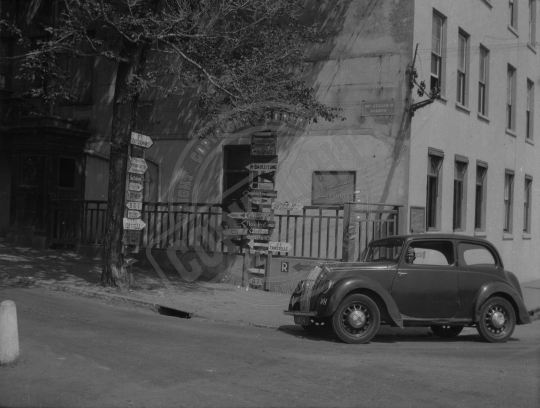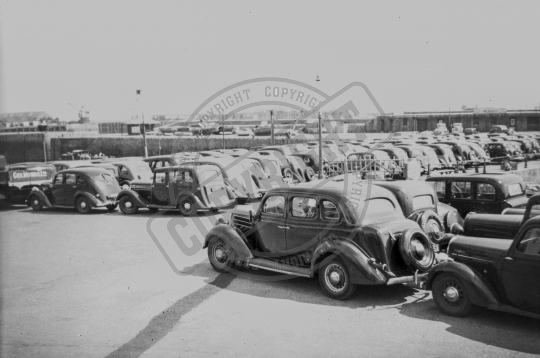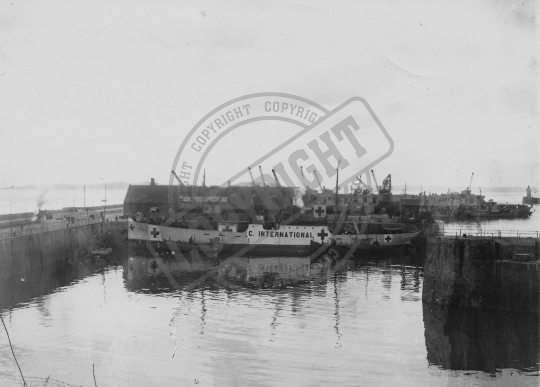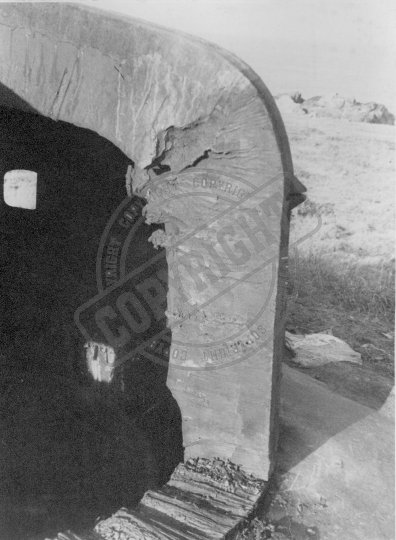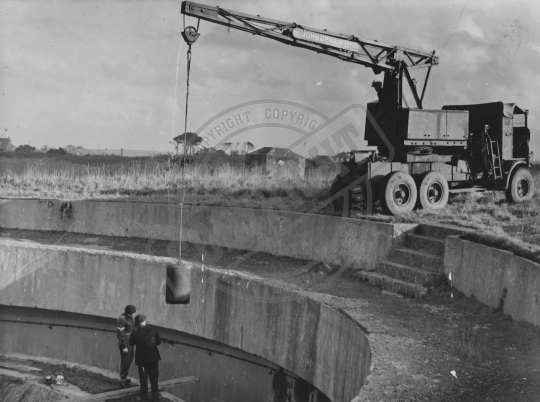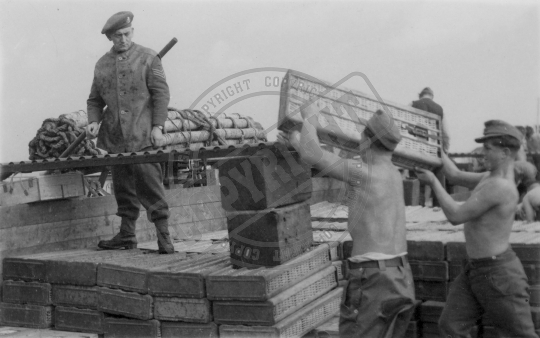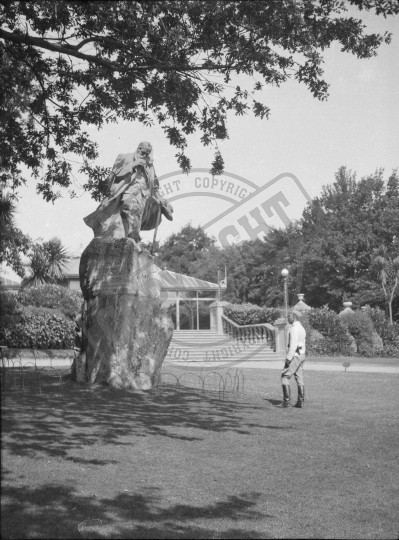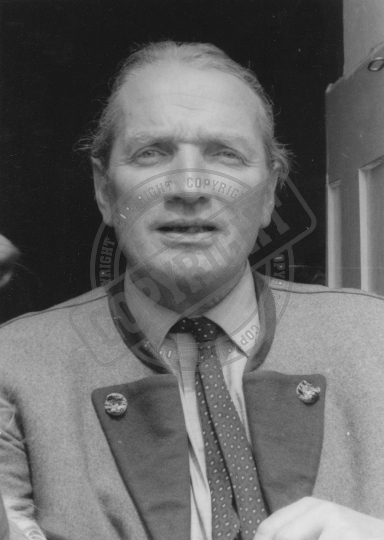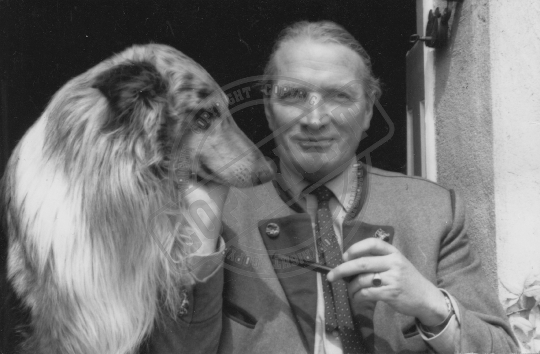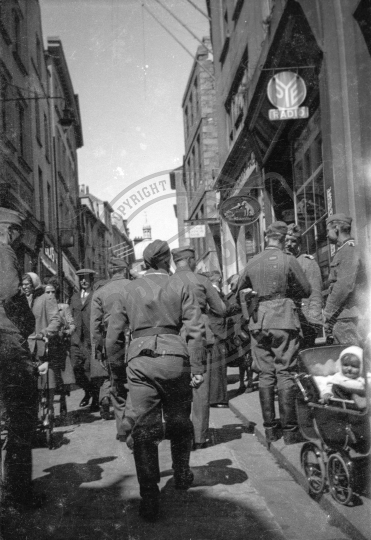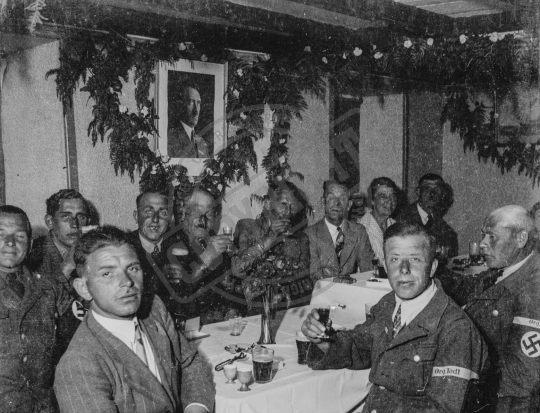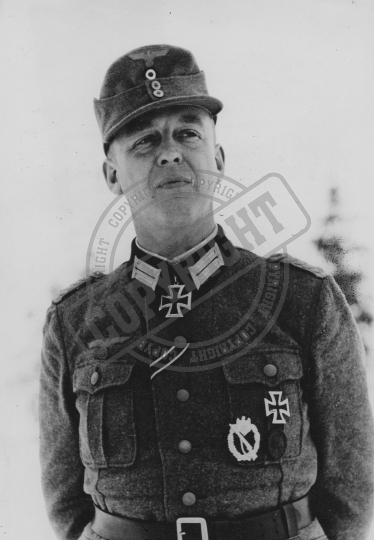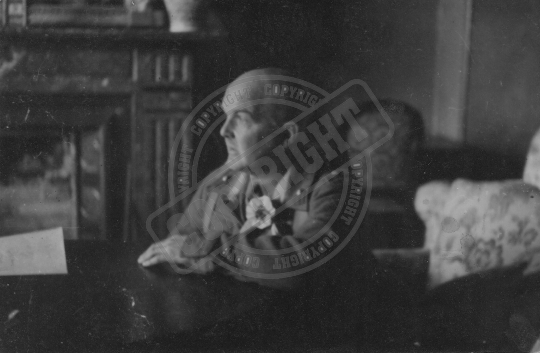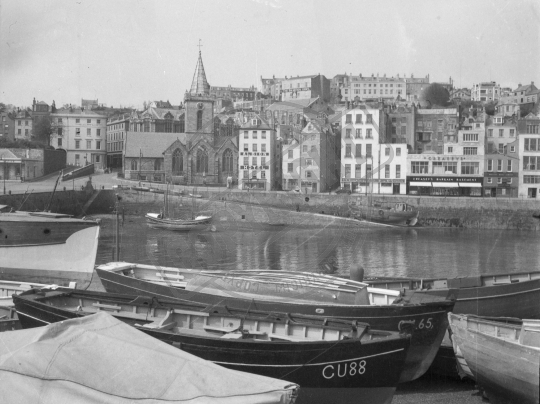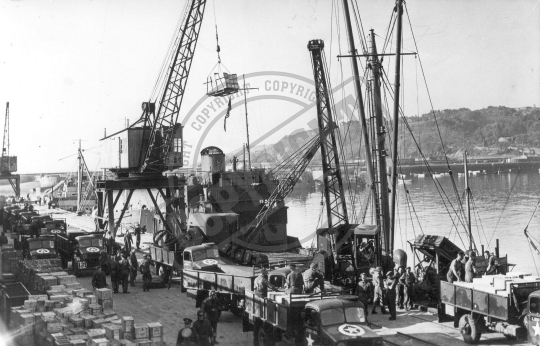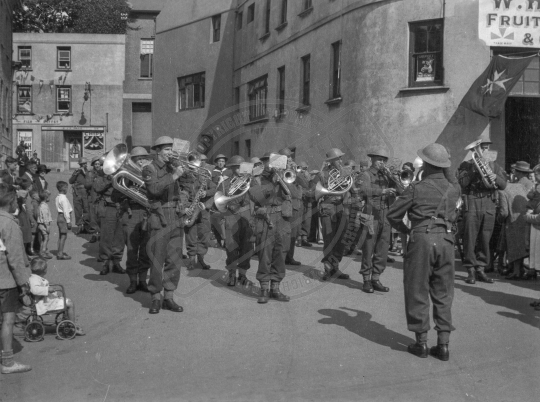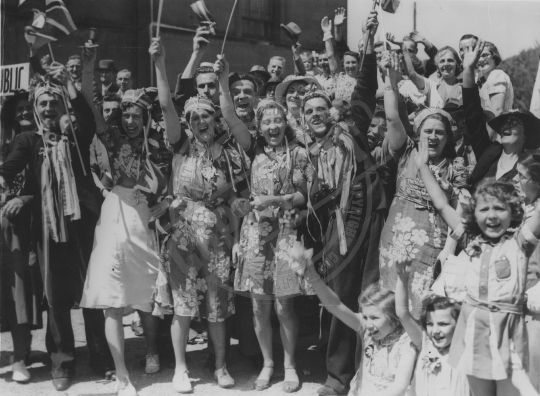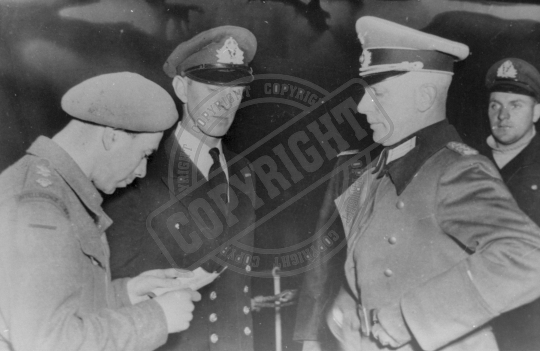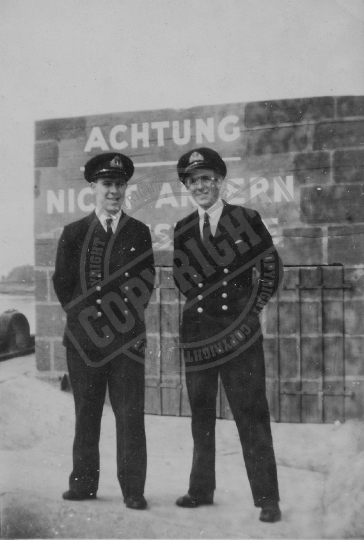Results (155)
CIMM_0072
Jersey Thursday 10th May 1945. Crowds of islanders lingered around the Weighbridge still excited from recent historic events and exchange pleasantries with the British troops sitting on the Pomme d’Or Hotel’s balcony.
CIMM_0071
Jersey Friday 11th May 1945. The Royal Court’s first sitting since the Liberation of Jersey assembled at 11 a.m. on Friday morning, 12 May 1945. In attendance were Force 135 officers including L to R; Captain C. Hargreaves, Major Anderson, making their way through the streets of St Helier to the Court.
CIMM_0070
Jersey Friday 11th May 1945. The Royal Court’s first sitting since the Liberation of Jersey assembled at 11 a.m. on Friday morning, 12 May 1945. In attendance were Force 135 officers including L to R; Captain L. Ogden, and Lt-Col W. Arnold, making their way through the streets of St Helier to the Court.
CIMM_0069
Jersey Thursday 10th May 1945. After the speeches the St James Boys Brigade Band, headed by Dae Donavan their drum-major, struck up a rousing march and marched out of the Royal Square followed by Lt-Col Robinson and the troops that had formed the Guard of Honour.
CIMM_0067
Jersey Thursday 10th May 1945. The section of crowd at the Pierson Hotel end of the Royal Square wait eagerly for the ceremony to begin.
CIMM_0066
Jersey Thursday 10th May 1945. The Guard of Honour is marched off the Weighbridge led by Lt-Col Robinson and followed closely by Captain Le Brocq.
CIMM_0065
Jersey Thursday 10th May 1945. The Guard of Honour is handed over to Lt-Colonel W. P. A. Robinson, MC, RA, the Island Commander, Jersey and Commanding Officer 620 Regiment, Royal Artillery. Captain Hugh Le Brocq is on the right.
CIMM_0063
Jersey Thursday 10th May 1945. Jerseyman Corporal Alex Mangan was kept busy signing autographs for islanders in Conway Street, St Helier.
CIMM_0062
Jersey Thursday 10th May 1945. Three Jersey lads, Private Raymond Ahier, Sergeant Winter de Gruchy, and Corporal Alex Mangan, serving with the 11th (RMIJ) Battalion, the Hampshire Regiment, in Broad Street, Jersey.
CIMM_0061
Jersey Liberation Wednesday 9th May 1945. After unfurling the Union Jack the two RN officers chat with a Russian worker (centre), Deputy Harbourmaster Bill Furzer (left) and Harbourmaster Captain Harry Richmond (right).
CIMM_0054
Jersey Liberation Wednesday 9th May 1945. Officers of LCI(L) 130 with a Royal Engineer Major (third left) from the 'Omelette’ Advance Party. L to R; First Lieutenant (name unknown), RNVR; Sub.Lt. Jimmy Cooper, RNVR; and Commanding Officer, Lt Charles Sanders, RNVR.
CIMM_0051
Three British soldiers guard the main gate at Fort Regent to prevent Jersey islanders from entering. John Langlois is the small boy on someone’s shoulders waving the Red Ensign, son of Fred and Mary Langlois. Third from left is 16-year-old Dennis Perrier.
CIMM_0050
A Royal Navy rating from HMS Beagle’s launch is also given a hero’s welcome by a group of Jersey islanders outside the Harbour Office at the Weighbridge.
CIMM_0049
The launch from HMS Beagle was swamped with autograph hunters at the end of the Albert Pier, Jersey.
CIMM_0048
The launch from HMS Beagle was swamped with autograph hunters at the end of the Albert Pier, Jersey.
CIMM_0047
The launch from HMS Beagle was swamped with autograph hunters at the end of the Albert Pier, Jersey. The sailor's supply of cigarettes rapidly diminished.
CIMM_0046
The launch from HMS Beagle was swamped with autograph hunters at the end of the Albert Pier, Jersey. The sailor's supply of cigarettes rapidly diminished.
CIMM_0045
A launch from HMS Beagle with two Royal Navy officers and four ratings on board prepares to tie up at the end of the Albert Pier, Jersey.
CIMM_0044
Everyone on the Albert Pier in Jersey wanted their photograph taken with the first Liberators ashore. L to R: Miss Betty Richomme, Miss Haines, St John Ambulance Nurses back row unknown, Mary Martret, Margaret Sewell, Surgeon-Lieutenant Ronald McDonald, Miss Frazer, Sub-Lieutenant David Milln, unknown, Maurice Gautier and Major V. Cooke.
CIMM_0043
As the craft carrying the German Island Commander and the Bailiff of Jersey reached the head of Elizabeth Castle breakwater it was passed by the launch from HMS Beagle inward bound. As the launch passed through the pierheads the crowd could see that the men on board were wearing Royal Navy uniforms, and they let out loud cheers of welcome.
CIMM_0041
Jersey Bailiff’s pinnace on its way to HMS Beagle anchored in St. Aubin’s Bay, off St. Helier. The Bailiff and the Solicitor General waved their hats repeatedly in acknowledgement as the pinnace headed out of the Harbour, whilst Generalmajor Wulf and his two staff officers stood silently in the stern of the vessel.
CIMM_0039
Jersey ex-political prisoners taken shortly after their release from the Newgate Street Prison. Left to Right: Bunny O’Neil, Mr. Rondel, Charles Gruchy, Martin Le Cornu, Hugh Le Cloche, Basil Thornton, the Dutchman Siebe Kosta, and John Bisson.
CIMM_0037
Tuesday 8th May 1945, the Jersey Bailiff, Alexander Coutanche, had a microphone erected on the balcony of the Royal Court witness room, facing the Royal Square. After the Prime Minister’s speech he spoke from the balcony to the crowd.
SP_0046.jpg
Flak Batterie Kapellendorf located off Les Grandes Capelles in St Sampson. This battery of four 8.8cm Flak 18 guns which were used in an anti-aircraft role. This sequence of photographs were taken in December 1941.
SP_0041.jpg
The gun crew of Flak Batterie Kapellendorf located off Les Grandes Capelles in St Sampson. This battery of four 8.8cm Flak 18 guns which were used in an anti-aircraft role. This sequence of photographs were taken in December 1941.
SP_0030.jpg
Flak Batterie Kapellendorf located off Les Grandes Capelles in St Sampson. This battery of four 8.8cm Flak 18 guns which were used in an anti-aircraft role. This sequence of photographs were taken in December 1941. Note the trailer for moving the gun in the background.
OA_104
A local police sergeant and civilian photographed with German soldiers outside the old Police Station located opposite St Pauls Church. The church was subsequently demolished and is now the site of the Sunken Garden.
OA_101
Looking across the roof of the former Moulin Huet Watermill, sited alongside the road leading down to Moulin Huet Bay with Jerbourg headland and the beach of Petit Port at low water in the distance.
OA_090
A local police sergeant photographed by a German soldier in Market Street looking towards the steps that led to the Commercial Arcade.
TPL_00322
As the military buildup increased, so did the number of road signs directing German forces to them. Many roads were thoroughly signposted like this example at the bottom of St Julian's Avenue, Guernsey. Note the Guernsey Press Censor in his car.
TPL_00325
The Germans commandeered all but a very few private cars on the island. These were taken to the Albert Pier to await shipment to France.
OA_014
The Swedish ship SS Vega, chartered by the International Red Cross to take Red Cross Supplies to the Channel Islands, at the London Berth, St Peter Port Harbour, Guernsey. Note German FK vessels moored alongside and trains on the quay.
TPL_00365
An armoured steel turret at Fort Doyle during the post war scrap metal drive, workers used gas axes and thermal lances to cut through the enormous steel sections.
TPL_00364
An ex-RAF Coles mobile crane lifts a depth charge found at Batterie Mirus by workers of John Upham during the scrap metal drive of the early 1950’s. The charge was originally thought to be a large grease drum used in the operation of the gun, camouflaging its true lethal purpose.
TPL_00360
As part of the post war clearance operations ammunition was loaded onto LCTs and dumped in the Hurd Deep. Here we see wicker baskets containing 8.8cm shells about to be thrown overboard by POWs.
TPL_00373
A German stands in front of the Victor Hugo statue in Candie Gardens, Guernsey. The 9,800kg limestone statue was made in 1913 by French sculptor Jean Boucher. It was transported from Paris to Cherbourg and then to Guernsey by steamboat before it was officially unveiled on 7 July 1914.
TPL_00356
Baron Max Von Aufsess, Civil administrator for three and a half years in Jersey. Photo taken post war at Schloss Aufsess, Bavaria.
TPL_00355
Baron Max Von Aufsess, Civil administrator for three and a half years in Jersey. Photo taken post war at Schloss Aufsess, Bavaria.
TPL_00294
German forces made a mad rush for the well stocked shops in the early days of the occupation. Here we see both Germans and civilians in the High Street, St Peter Port, Guernsey.
OA_063
Generalmajor Rudolf Wulf who was the Festungskommandant Jersey at liberation seen here after the award of his Knight’s cross of the Iron Cross, on 12th January 1943. At the time he was an Oberstleutnant (Lieutenant-Colonel) in charge of an infantry regiment.
OA_033
Guernsey, 9th May 1945. Colonel H. R. Power, OBE, MC (late Glosters), Chief civil affairs Officer (CCAO), No. 20 Civil Affairs Unit, HQ Guernsey, Force 135.
TPL_00255
Fishing boats laid up at the Old Harbour, St Peter Port, following the order for all boats to be moved to main harbours.
TPL_00211
A cargo vessel from Group III of the Liberation Fleet which arrived at St Peter Port Harbour, Guernsey, on 13th May carrying essential supplies. Once unloaded the much awaited food stuffs were transported to the Detail Issue Depot (DID), ready for distribution to islanders.
TPL_00194
The Duke of Cornwall’s Light Infantry (DCLI) Band stops to play in the street leading from Le Pollet into the North Esplanade, St Peter Port. Their schedule was a busy one as they played at the Proclamation Ceremony at Elizabeth College during the early afternoon of Saturday 12th May 1945 and were then transported by ship to Jersey for a similar ceremony in the Royal Square, St Helier later in the day.
TPL_00187
A crowd of joyous Guernsey islanders in front of the States building in St Peter Port on May 9th 1945.
TPL_00181
Generalmajor Siegfried Heine boarding HMS Bulldog just after midnight on Wednesday 9th May presents his Identification Authorisation to Captain H. Herzmark of the Intelligence Corps. He was escorted to the Wardroom to meet with the three British representatives to discuss the technicalities of surrender.
OA_071
Surgeon-Lieutenant Ronald McDonald, RNVR, and Sub-Lieutenant David Milln, RN, shortly after landing at the end of the Albert Pier, St Helier, Harbour, Jersey, on Wednesday morning 9th May, 1945. The German sign behind them advises Achtung Nicht Ankern Hafenspere (Attention No Anchoring Harbour Boom).



